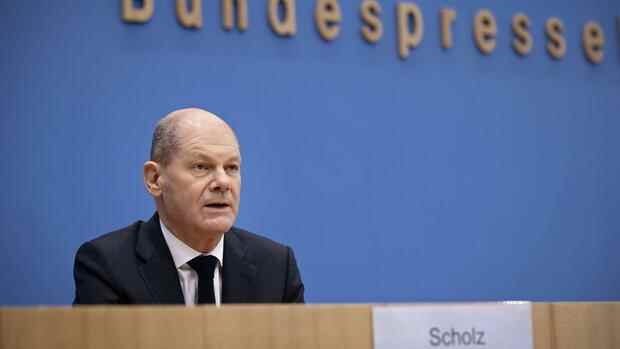Berlin The future traffic light coalitionists took just ten minutes to report completion: The coalition agreement was signed on Tuesday morning, “during which we will leave for a new government,” said future Chancellor Olaf Scholz (SPD).
But no party mood really wanted to arise, which was not only due to the short appearance. All strength is now needed to cope with the corona crisis, said Scholz. The pandemic also dominates this final step ahead of the cabinet swearing in on Wednesday.
It is the first major test for the SPD, Greens and FDP, which became abundantly clear on that day. Although the number of cases is falling slightly, the situation in the intensive care units is still critical. In addition, the vaccination campaign is running slowly, and the new virus variant Omikron is causing concern.
The future coalition is about a “departure,” said Scholz later in the federal press conference. “But we are still busy fighting the corona pandemic.” The infection process comes from the unvaccinated. “There is no doubt about that.” It is therefore very clear that restrictions are necessary for those who have not been vaccinated.
Top jobs of the day
Find the best jobs now and
be notified by email.
The federal and state governments agreed last week that access to shops beyond daily needs would be limited to vaccinated and convalescent people. Access to cultural and leisure facilities as well as restaurants should only be given to those who have been vaccinated and those who have recovered. Children and people who cannot be vaccinated for health reasons, for example, are excluded.
Scholz defended these measures at the federal press conference. It was his first appearance on this topic without Chancellor Angela Merkel (CDU) at his side, as at the federal-state summits in recent weeks.
The pandemic dominates the start of the traffic light coalition, which has now signed its coalition agreement.
(Photo: dpa)
“We have to do everything we can to protect the health of the citizens, and that will only succeed if a large number of them get vaccinated,” said Scholz. There is already a high vaccination rate, and millions of booster vaccinations are currently being added. Scholz reiterated the goal of 30 million vaccinations by Christmas.
At the same time he sent a clear message with a view to the protests in Saxony. “If torchlight lifts then take place in front of the house of a health minister, then that is meant as a threat,” said Scholz.
On Friday there was a torchlight march of opponents of the state corona policy in front of the house of the Saxon Minister of Health Petra Köpping (SPD). Scholz announced that the Democrats would resolutely oppose such aggressive action. “Society must not allow itself to be infected by this.”
FDP leader Christian Lindner expressed himself accordingly. “Our state is a defensive democracy,” emphasized Lindner. The FDP boss was of the opinion that the Infection Protection Act, which was changed by the majority of traffic lights in the Bundestag, could contribute to social pacification. Because if fundamental rights encroachments are needed in the fight against Corona in the future, these would be carried out on the basis of parliamentary laws and discussed in public.
Debate in the Bundestag
On Tuesday lunchtime, the Bundestag discussed more stringent measures that the SPD, Greens and FDP want to achieve with an amendment to the Infection Protection Act. This also provides for a job-related vaccination obligation, which the MPs discussed in Parliament for the first time.
The previously announced draft law stipulates that the rule will be introduced by March 15, 2022. Employees in clinics, nursing homes, medical practices, emergency services or maternity facilities are affected.
Vulnerable groups could not choose who cared for them, said the health policy spokeswoman for the SPD, Sabine Dittmar, in the Bundestag. A high vaccination rate in clinics and nursing homes is therefore essential.
But not only there, she said with the reason: “In order not to get caught in a continuous loop of waves of infection again and again.” That is why a “social protection wall” is needed so that the protective measures could finally end.
The health policy spokeswoman for the Greens, Maria Klein-Schmeink, warned against the new Omikron variant. “We may have to experience that the vaccines no longer work,” she said. “If we don’t tackle this together, we will be overwhelmed by the next wave, which will restrict us again.” The traffic lights will therefore also readjust if necessary.
Union parliamentary group Vice Thorsten Frei (CDU) criticized the traffic light, however, for letting the epidemic situation expire. This is not understandable given the high number of cases. The epidemic situation expired on November 25 and served as the legal basis for corona measures, which the Infection Protection Act only partially enables after a change by the SPD, Greens and FDP.
Frei called for the epidemic situation to be prolonged. The traffic light measures are “too little, too late”. There was also criticism from the left-wing parliamentary group. The “hut burned brightly” before the traffic light coalition acted, said parliamentary deputy Susanne Feschl. “Strategy looks different.”
More: Compulsory vaccination, gastro closure, ban on events: The traffic light coalition intends to adopt these rules this week
